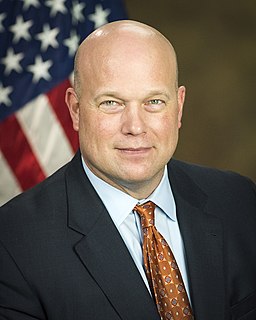A Quote by Michael Newdow
A federal judge did as he was supposed to do and upheld the Constitution. We should be thankful that we have judiciary that will do that.
Quote Topics
Related Quotes
The tenth amendment said the federal government is supposed to only have powers that were explicitly given in the Constitution. I think the federal government's gone way beyond that. The Constitution never said that you could have a Federal Reserve that would have $2.8 trillion in assets. We've gotten out of control.
I think [John Adams's] influence on the federal Constitution was indirect. Many including James Madison mocked the first volume of Adams's Defence of the Constitutions of the United States in 1787. But his Massachusetts constitution was a model for those who thought about stable popular governments, with its separation of powers, its bicameral legislature, its independent judiciary, and its strong executive.
[The Massachusetts constitution] resembles the federal Constitution of 1787 more closely than any of the other revolutionary state constitutions. It was also drawn up by a special convention, and it provided for popular ratification - practices that were followed by the drafters of the federal Constitution of 1787 and subsequent state constitution-makers.
The germ of dissolution of our federal government is in the constitution of the federal judiciary; an irresponsible body, (for impeachment is scarcely a scare-crow) working like gravity by night and by day, gaining a little today and a little tomorrow, and advancing its noiseless step like a thief, over the field of jurisdiction, until all shall be usurped from the States, and the government of all be consolidated into one.
How to check these unconstitutional invasions of rights by the Federal judiciary? Not by impeachment in the first instance, but by a strong protestation of both houses of Congress that such and such doctrines advanced by the Supreme Court are contrary to the Constitution; and if afterwards they relapse into the same heresies, impeach and set the whole adrift. For what was the government divided into three branches, but that each should watch over the others and oppose their usurpations?
The proposed constitution, therefore, even when tested by the rules laid down by its antagonists, is, in strictness, neither a national nor a federal constitution; but a composition of both. In its foundation it is federal, not national; in the sources from which the ordinary powers of the government are drawn, it is partly federal, and partly national; in the operation of these powers, it is national, not federal; in the extent of them again, it is federal, not national; and finally, in the authoritative mode of introducing amendments, it is neither wholly federal, nor wholly national.






























